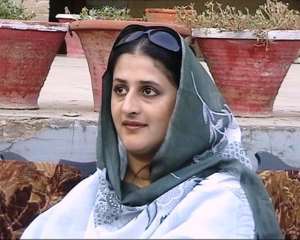
DARHOON MENGHWAR
HYDERABAD SINDH: Parliamentary Secretary for Health Mahreen Bhutto has informed to National Assembly yesterday that HIV/AIDS cases in Pakistan has reached the number of 80 thousands of people and the virus may spread rapidly if stake holders don't take quick efforts.
Mahreen was responding to a calling-attention notice during National Assembly session and she criticized on HIV/AIDS control programme that during last six years the reputation of National AIDS control programme was very weak, they don't work well, but the government is doing hardwork to aware the society. Government was pursing a comprehensive plan to encourage awareness for preventive measures, as AIDS is incurable.
Pakistan is the major country in South Asia, where HIV is spreading hurriedly through injecting drug users. Heroin, poppy and other drugs are easily available in the markets, that come from the smuggle from the neighbor country Afghanistan, while sharing syringes and dirty needles represents a high risk.
According to Sindh AIDS Control Authority, in Pakistan 60 to 70% HIV spreads through IDU, 20% through MSM, 6% FSM, 0.1 % Mother to Child, 4 % through other causes. The truck drivers and labor force is the main source that spread HIV through urban to rural areas, Hijra's (lady boys) is the second major factor in urban areas.
“It is also responsibility of parliamentarian to aware the nation, they are seen like leaders and heroes in their home areas. We will encourage their struggle, but they should address these issues in public, because parliament members can play a key role in educating the population.”, Mahreen said.
Unfortunately, Pakistan remains 32 years under the umbrella of dictatorship from their 61 years age, so corruption raised and institutions got down, only some of them are doing research and working well to provide basic facility to the nation .Now democracy is growing its roots, and slowly change is coming come.
Meanwhile, the education system is still weak, especially the government sector education is suffering due to political interference, female education ratio is less then 40%, while male is 50%. In rural areas more then 80 % women are uneducated, they don't know about their rights, even they can't go outside their home. Feudal system never wants education backward in the society, so mostly the farmers children are illiterate.
In Pakistan one woman dies in each 20 minutes during or after pregnancy, and 30 thousands women die every year due to that problem. In rural areas pregnant women are not allowed to go to hospital for delivery. In stead of that, unskilled ''Daies'' are available in villages and they do the deliveries. So mortality ratio is high, mostly pregnant women lossing their life because of these unskilled ''daies''. In mostly rural areas there are no lady-doctors. Lachhami, a social worker, who is working in field of health in rural areas nearby Hyderabad said: “In this complicated situation, how do you expect to aware someone about HIV/AIDS, if people don't read anything that says that HIV is dangerous; mostly, the concept of people of Pakistan is that the HIV is the disease of Europe.”
Due to poor management, Pakistan has failed to achieve the target of Polio free country. Campaign against Polio was started before 2000, and completed so many rounds of vaccine, but unfortunately cases have been raised. Pakistan signed the Millennium Development Goal. Under this Pakistan should be a Polio free country in 2015, but this is unlikely to be achieved. Now, President of Pakistan, Mr. Asif Ali Zardari appoints advisor to his daughter, Aseefa Zardari Bhutto, to achieve target. in Pakistan more then 60 children affected of Polio.
“Government should create a post of advisor on national level and to appoint a famous person like Aseefia to aware the society about HIV/AIDS. Political and social leaders share their role and they should participate in public places, workshops and seminars. Stake holders should build up home to home education campaign. But, education about HIV/AIDS in schools is impossible.”, said the Development sector expert - Dr. Sono.




 2024 elections: Campaigning for 'incompetent' Mahama an insult to Ghanaians — Fo...
2024 elections: Campaigning for 'incompetent' Mahama an insult to Ghanaians — Fo...
 Bawumia promises release of monies owed nursing trainees
Bawumia promises release of monies owed nursing trainees
 2024 elections: We'll not tolerate NPP's intimidation, 'killing' tactics — Musta...
2024 elections: We'll not tolerate NPP's intimidation, 'killing' tactics — Musta...
 ECG workers rubbish Bawumia's 'ransomware attack' claim
ECG workers rubbish Bawumia's 'ransomware attack' claim
 Mahama created unemployment when he was president; we have created jobs for Ghan...
Mahama created unemployment when he was president; we have created jobs for Ghan...
 "Help my tenure to be a memorable one" — Finance Minister tells GRA staff at Afl...
"Help my tenure to be a memorable one" — Finance Minister tells GRA staff at Afl...
 Bawumia has selected running mate already – Sammi Awuku reveals
Bawumia has selected running mate already – Sammi Awuku reveals
 Dismiss Addai-Mensah as KATH CEO – Group petition Akufo-Addo
Dismiss Addai-Mensah as KATH CEO – Group petition Akufo-Addo
 VRA Senior staff association kick against privatisation calls
VRA Senior staff association kick against privatisation calls
 Prices of goods to increase as traders can’t restock, repay bank loans due to ce...
Prices of goods to increase as traders can’t restock, repay bank loans due to ce...
